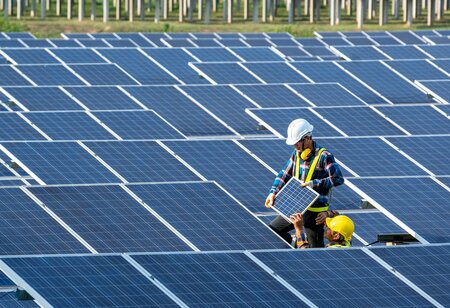Reliance Industries Looking To Acquire Norway's Solar Module Maker REC
 Reliance Industries Ltd (RIL) is looking to buy the Norwegian solar module manufacturer REC Group as part of the oil refiner’s ₹75,000 crore push into clean energy, said two people aware of the development.
Reliance Industries Ltd (RIL) is looking to buy the Norwegian solar module manufacturer REC Group as part of the oil refiner’s ₹75,000 crore push into clean energy, said two people aware of the development.
Chairman and managing director Mukesh Ambani had proclaimed plans to set up the Dhirubhai Ambani Green Energy Giga Complex on 5,000 acres in Jamnagar at the firm’s annual general meeting last month. The complex would have an integrated solar photovoltaic (PV) module giga factory. Norway’s REC Group has an annual solar panel production capacity of 1.8 gigawatts (GW) and has installed around 10GW capacity globally. REC, founded in 1996, has regional hubs in North America, Europe and Asia-Pacific.
In an emailed response, a spokesperson for RIL deteriorated to “comment on media speculation and rumours".
“Our company evaluates various opportunities on an ongoing basis," the spokesperson stated.
An REC Group spokesperson said the company “is in general not commenting about rumours in the marketplace."
Though India is planning to develop 175GW of renewable capacity, including 100GW of solar, by 2022, the solar equipment space is dominated by Chinese makers such as Trina Solar Ltd, Jinko Solar, ET Solar, Chint Solar and GCL-Poly Energy Holdings Ltd. India has a manufacturing capacity of only 3GW for solar cells and 15GW for solar modules.
“REC is considered to be a good quality supplier," stated one of the two people cited above, requesting anonymity.
Chinese solar equipment suppliers have increased module prices to 25 cents per kWh. Starting in December, Chinese module manufacturers increased prices by more than a fifth and began reneging on their contracts to supply equipment, ignoring the risk of their bank guarantees getting encashed, as per a report.
“We will start with raw silica and convert this to polysilicon, which we will then convert to ingot and wafers. These wafers would be used to make high-efficiency solar cells and finally assembled into solar modules of the highest quality and durability," Ambani articulated in his speech last month.
The firm’s plans come amid the ₹4,500 crore production linked incentive (PLI) scheme for manufacturing solar photovoltaic modules to help India ramp up its capacity. The scheme is likely to support add 10GW capacity and bring direct investments of around ₹17,200 crore. Along with leveraging its growing green energy market to increase manufacturing, India is also looking to play a larger role in global supply chains.
“We will target to achieve costs that are the lowest in the world to ensure affordability of our solar modules," Ambani spoke in his speech. “Reliance will establish and enable at least 100GW of solar energy by 2030. A significant part of this will come from rooftop solar and decentralized solar installations in villages."
India would impose 40% basic customs duty on solar modules and 25% on solar cells from 1 April 2022, a move that would make imports costlier and encourage local manufacturing. Also, the ministry of new and renewable energy has issued an order enforcing a list of approved solar PV models and module manufacturers for government-supported schemes, including projects from where distribution firms procure power.
India has established a target of 450GW renewable energy capacity by 2030. It presently has an installed renewable energy capacity of 89.63GW, with 49.59GW under execution.
RIL also plans to establish giga factories for electrolyzer, fuel cell and energy storage respectively at Jamnagar.




